Showing posts with label Iphone 6. Show all posts
Tuesday, 18 November 2014
Samsung to cut smartphone models by up to a third in 2015
Samsung will stop producing so many models of smartphones and focus on a core set of devices in the new year, the company said Tuesday.
Speaking to investors in New York, Samsung's head of investor relations, Robert Yi, said his company plans to cut the number of smartphone models it produces in 2015 by 25 percent to 30 percent, The Wall Street Journal reported.
Though Samsung is still a juggernaut in the mobile business, the company has watched its smartphone business start to falter in key markets, such as China. In China specifically, chief competitor Xiaomi has been able to increase smartphone shipments and get consumers excited about its products by delivering higher-end devices at budget-conscious prices.
Meanwhile, Apple, with its new iPhone 6 and iPhone 6 Plus, has moved to offer smartphones with larger screens, which had been a key point of distinction for Samsung.
The South Korean company's latest quarterly returns put the situation in stark relief. At the end of October, Samsung said that third-quarter income in its mobile business tumbled 74 percent from the previous year and that its operating profits were the lowest they'd been since the middle of 2011. It also warned that smartphone competition would be fierce toward the end of the year.
Samsung is also dealing with increasingly strained margins as its marketing costs have risen considerably. In the third quarter, the company generated just 7 percent margins on smartphones, down from 15 percent in previous years, the Journal reported.
Prompted by the shifts, Samsung had already said that it plans to "fundamentally reform" its product lineup.
Here's how overwhelming Samsung's array of products has become: In just its flagship Galaxy S line, Samsung offers five models beyond the namesake Galaxy S5: the knockabout Galaxy S5 Active and Galaxy S5 Sport; the more modest Galaxy S5 Mini; the Galaxy K Zoom with a higher-end camera; and the Galaxy S5 LTE-Advanced for higher Internet speeds.
There's also the Note phablet line, the new, metal-clad Galaxy Alpha devices and a long list of other Android and Windows Phones devices.
The idea behind streamlining its offerings is simple: the company will be able to cut its overall costs and find ways to improve efficiency in production. Marketing dollars will also be spread across fewer products. Samsung is also planning to use the same components in multiple products to help cut costs.
Yi didn't say how many smartphones the company will ship next year. The company did not respond to a request for comment.
CNET
Speaking to investors in New York, Samsung's head of investor relations, Robert Yi, said his company plans to cut the number of smartphone models it produces in 2015 by 25 percent to 30 percent, The Wall Street Journal reported.
Though Samsung is still a juggernaut in the mobile business, the company has watched its smartphone business start to falter in key markets, such as China. In China specifically, chief competitor Xiaomi has been able to increase smartphone shipments and get consumers excited about its products by delivering higher-end devices at budget-conscious prices.
Meanwhile, Apple, with its new iPhone 6 and iPhone 6 Plus, has moved to offer smartphones with larger screens, which had been a key point of distinction for Samsung.
The South Korean company's latest quarterly returns put the situation in stark relief. At the end of October, Samsung said that third-quarter income in its mobile business tumbled 74 percent from the previous year and that its operating profits were the lowest they'd been since the middle of 2011. It also warned that smartphone competition would be fierce toward the end of the year.
Samsung is also dealing with increasingly strained margins as its marketing costs have risen considerably. In the third quarter, the company generated just 7 percent margins on smartphones, down from 15 percent in previous years, the Journal reported.
Prompted by the shifts, Samsung had already said that it plans to "fundamentally reform" its product lineup.
Here's how overwhelming Samsung's array of products has become: In just its flagship Galaxy S line, Samsung offers five models beyond the namesake Galaxy S5: the knockabout Galaxy S5 Active and Galaxy S5 Sport; the more modest Galaxy S5 Mini; the Galaxy K Zoom with a higher-end camera; and the Galaxy S5 LTE-Advanced for higher Internet speeds.
There's also the Note phablet line, the new, metal-clad Galaxy Alpha devices and a long list of other Android and Windows Phones devices.
The idea behind streamlining its offerings is simple: the company will be able to cut its overall costs and find ways to improve efficiency in production. Marketing dollars will also be spread across fewer products. Samsung is also planning to use the same components in multiple products to help cut costs.
Yi didn't say how many smartphones the company will ship next year. The company did not respond to a request for comment.
CNET
Thursday, 6 November 2014
Palo Alto Networks discovers new malware targeted at Apple devices
Palo Alto Networks Inc (PANW.N) has discovered a new family of malware that can infect Apple Inc's (AAPL.O) desktop and mobile operating systems, underscoring the increasing sophistication of attacks on iPhones and Mac computers.
The "WireLurker" malware can install third-party applications on regular, non-jailbroken iOS devices and hop from infected Macs onto iPhones through USB connector-cables, said Ryan Olson, intelligence director for the company's Unit 42 division.
Palo Alto Networks said on Wednesday it had seen indications that the attackers were Chinese. The malware originated from a Chinese third-party apps store and appeared to have mostly affected users within the country.
The malware spread through infected apps uploaded to the apps store, that were in turn downloaded onto Mac computers. According to the company, more than 400 such infected apps had been downloaded over 350,000 times so far.
It's unclear what the objective of the attacks was. There is no evidence that the attackers had made off with anything more sensitive than messaging IDs and contacts from users' address books, Olson added.
But "they could just as easily take your Apple ID or do something else that's bad news," he said in an interview.
Apple, which Olson said was notified a couple weeks ago, did not respond to requests for comment on Wednesday.
Once WireLurker gets on an iPhone, it can go on to infect existing apps on the device, somewhat akin to how a traditional virus infects computer software programs. Olson said it was the first time he had seen it in action. "It's the first time we've seen anyone doing it in the wild," he added.
The "WireLurker" malware can install third-party applications on regular, non-jailbroken iOS devices and hop from infected Macs onto iPhones through USB connector-cables, said Ryan Olson, intelligence director for the company's Unit 42 division.
Palo Alto Networks said on Wednesday it had seen indications that the attackers were Chinese. The malware originated from a Chinese third-party apps store and appeared to have mostly affected users within the country.
The malware spread through infected apps uploaded to the apps store, that were in turn downloaded onto Mac computers. According to the company, more than 400 such infected apps had been downloaded over 350,000 times so far.
It's unclear what the objective of the attacks was. There is no evidence that the attackers had made off with anything more sensitive than messaging IDs and contacts from users' address books, Olson added.
But "they could just as easily take your Apple ID or do something else that's bad news," he said in an interview.
Apple, which Olson said was notified a couple weeks ago, did not respond to requests for comment on Wednesday.
Once WireLurker gets on an iPhone, it can go on to infect existing apps on the device, somewhat akin to how a traditional virus infects computer software programs. Olson said it was the first time he had seen it in action. "It's the first time we've seen anyone doing it in the wild," he added.
Sunday, 2 November 2014
5 Tough Cases for Your iPhone 6
The iPhone 6 is bigger than ever, meaning you get the benefits of a large screen — an improved display and functionality — but also a greater target to crack if it’s dropped (not to mention its bendable aluminum case). This is why you might want more rugged protection with the new iPhone 6 and 6 Plus. Here are five cases to better protect your new smartphone — bends, unexpected drops, and beer spills included.
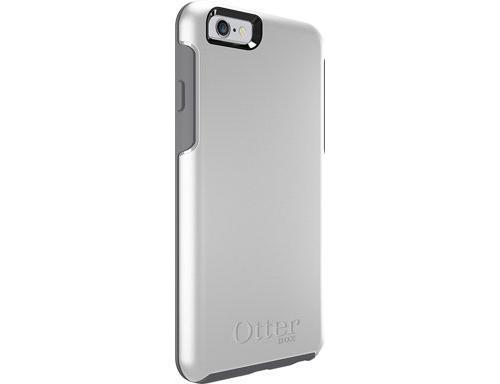
1. Best for unobtrusive protection
The Case: OtterBox Symmetry Series (Current price: $49.95 for iPhone 6 Plus case)
What We Like: It easily fit in our pocket. (And our iPhone 6 didn’t bend.)
Toughness: The Symmetry’s thin frame has just enough rubber jutting out on the front to protect the screen. Overall, it’s unobtrusive and designed to look like a form that goes over the phone rather than a case. Plus, the rubber and silicone edges give the phone a bounce when dropped dangerously on its corners or edges.
More from Men’s Journal:
The 9 Most Stylish iPhone 6 Cases on the Market
The 10 Best Smartphone Accessories
Should You Buy an iPhone 6?
More from Men’s Journal:
The 9 Most Stylish iPhone 6 Cases on the Market
The 10 Best Smartphone Accessories
Should You Buy an iPhone 6?
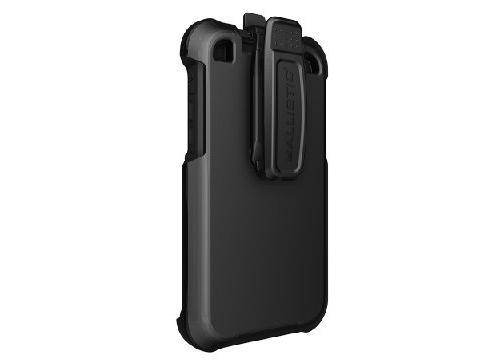
2. Best for outdoor use
The Case: Ballistic Hard Core Case ($60)
What We Like: That extra security that makes you feel a lot more powerful than you actually are.
Toughness: This one means business. Four pieces combine to shield your iPhone. In fact, you should probably be more worried about getting it out of the case. The main unit keeps it secure with several clasps and a screen cover. A third, tougher layer’s clip lets you carry it on your side, which might be preferable to your pockets. To round it off, a rubber exterior shell provides extra padding for drops up to 12 feet.
What We Like: That extra security that makes you feel a lot more powerful than you actually are.
Toughness: This one means business. Four pieces combine to shield your iPhone. In fact, you should probably be more worried about getting it out of the case. The main unit keeps it secure with several clasps and a screen cover. A third, tougher layer’s clip lets you carry it on your side, which might be preferable to your pockets. To round it off, a rubber exterior shell provides extra padding for drops up to 12 feet.
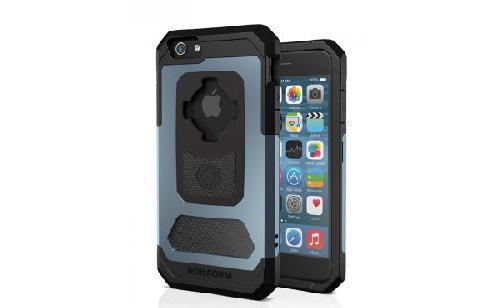
3. Best for commuting
The Case: Rokform Aluminum Case ($98.99)
What We Like: The mounting accessories. They make it possible to use your phone’s GPS in the car or on your bike commute without worrying about that inevitable drop. Because it’s not a question of if it’s going to happen, but when.
Toughness: California-based Rokform designed this body of tech armor with sturdy aluminum and rubber that protect your phone on all sides and edges.
What We Like: The mounting accessories. They make it possible to use your phone’s GPS in the car or on your bike commute without worrying about that inevitable drop. Because it’s not a question of if it’s going to happen, but when.
Toughness: California-based Rokform designed this body of tech armor with sturdy aluminum and rubber that protect your phone on all sides and edges.
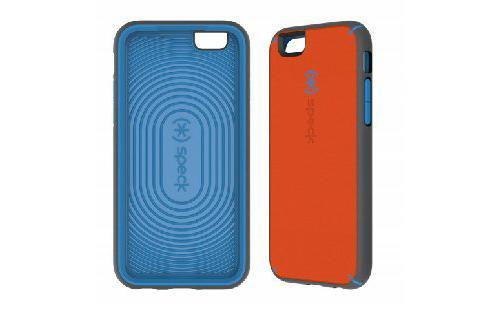
4. Best for Grip
The Case: Speck MightyShell ($34.95)
What We Like: The outer edges offer some extra holding power, which will come in handy when you upgrade and first grab your phone.
Toughness: Don’t let the fun colors and thin body fool you — this case can withstand some pretty intense impact. Speck prepared the MightyShell to expect those drops down flights of stairs with a shock-absorbing casing that surrounds the phone, including the front edges of the fragile screen.
What We Like: The outer edges offer some extra holding power, which will come in handy when you upgrade and first grab your phone.
Toughness: Don’t let the fun colors and thin body fool you — this case can withstand some pretty intense impact. Speck prepared the MightyShell to expect those drops down flights of stairs with a shock-absorbing casing that surrounds the phone, including the front edges of the fragile screen.
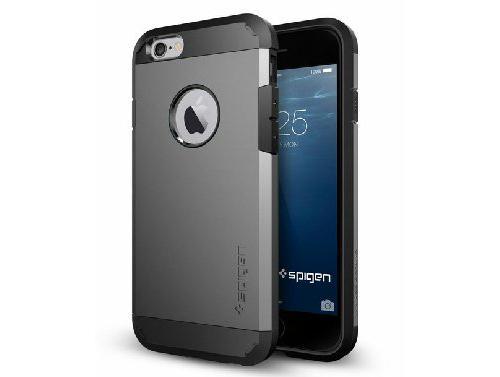
5. Best for sliding in your pocket
The Case: Spigen Tough Armor Case ($35)
What We Like: Its slim design and armor-like appearance.
Toughness: The name of this case indicates serious protection — and then some. With a polycarbonate body and an intuitive design, your phone will feel safe without being in the way. Although it’s not as large as a traditional heavy-duty case, the Tough Armor houses a slim profile with an outer lip that prevents a cracked screen, which can be a hard thing to find in thinner cases.
What We Like: Its slim design and armor-like appearance.
Toughness: The name of this case indicates serious protection — and then some. With a polycarbonate body and an intuitive design, your phone will feel safe without being in the way. Although it’s not as large as a traditional heavy-duty case, the Tough Armor houses a slim profile with an outer lip that prevents a cracked screen, which can be a hard thing to find in thinner cases.
Yahoo
Samsung’s 2 New Phones Are All Metal, All Selfie, All Too Familiar
Oh, hey, is that your iPhone … wait a minute. That’s not an iPhone. That’s a … Samsung?
That’s right; Samsung has just announced two new smartphones that are dead ringers for Apple’s iPhone 5 and 5s. Say hello to the Galaxy A5 and the Galaxy A3, two handsets that Samsung hopes will get younger smartphone shoppers interested in the Korean company’s wares.
Samsung is pushing the handsets’ “social networking” capabilities, which is to say they’ve got sharp front cameras for taking clear selfies. Does anyone else find it upsetting that phones are now being marketed based on their selfie abilities?

Duck-faced bathroom mirror photos aside, another thing that makes the Galaxy A5 and A3 so interesting is the fact that they use an all-metal design. That means that the phones are built just like Apple’s iPhone and HTC’s One M8, two of the most attractive phones on the market.
Samsung has taken a lot of heat for using too much plastic on its smartphones, while other companies use more premium metal materials. With its recent Galaxy Alpha and Note 4, Samsung has tried to change course, using aluminum frames but sticking with plastic back panels.
The phones’ unibody designs also help make them the thinnest Samsung smartphones around, with the A5 and A3 measuring just 0.26 inches and 0.27 inches thick, respectively.
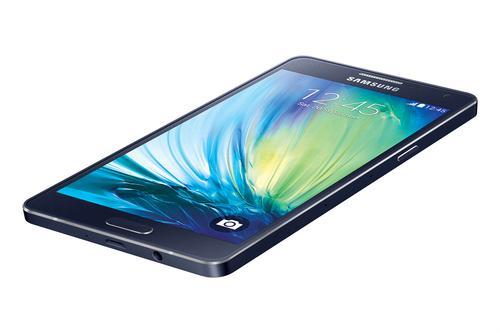
Both phones get Samsung’s excellent Super AMOLED display technology, though the A5 gets a 5-inch HD screen and the A3 gets a 4.5-inch qHD screen. That means the A5’s display will be sharper and clearer than the A3’s.
Inside, the Galaxy A5 and A3 get quad-core processors, though the A5 gets 2 GB of RAM, while the A3 gets just 1 GB, so the A5 will likely be a bit faster than its sibling.
The Galaxy A5 also gets a 13-megapixel rear camera versus the A3’s 8 MP rear camera. Both phones, however, get the same 5-megapixel front cameras. Most smartphones don’t offer front-facing cameras with such high megapixel counts, but Samsung wants to make sure your selfies look as good as possible.
There’s just one downside to the Galaxy A5’s and Galaxy A3’s new unibody design, and that’s the fact that the phones’ back panels aren’t removable, so you won’t be able to replace their batteries if they start to go south on you. Still, the handsets will include microUSB card slots for expanding storage space.
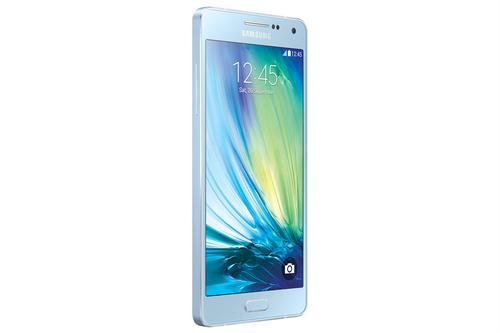
The Galaxy A5 and Galaxy A3 are the latest in a string of smartphones Samsung has released in 2014. In fact, in 2014 alone, the company has debuted no fewer than 10 new handsets.
The largest smartphone manufacturer in the world, Samsung has hit a rough patch as of late, with the company recently announcing that it saw a 60 percent drop in profit. Sales of Samsung smartphones also saw a decrease of 20 percent versus last year.
One of the biggest issues facing Samsung has been its performance in China, the largest smartphone market in the world. Chinese consumers have begun moving away from Samsung’s devices in favor of local brands, which are generally high quality and low cost.
The Galaxy A5 and A3, which will launch first in China as midrange handsets, are a clear indication that Samsung is serious about winning back Chinese consumers.
So far, Samsung hasn’t announced any plans to bring the Galaxy A5 and A3 to the United States. But we’re still holding out hope. At the very least, we’d like to see more Samsung phones use the new handsets’ design.
Daniel Howley - YAHOO
Friday, 24 October 2014
Sprint’s ‘iPhone for Life’ Plan to Offer Annual Upgrades
Sprint is not standing still, continuing to tinker with its plans as it seeks to win over new customers.
The latest: an adjustment to its widely touted “iPhone for Life” plan, now offering customers the ability to sign up for a version of the plan that lets them swap in a new iPhone every year. The original plan called for customers to pay as little as $20 a month to lease a new iPhone 6, which could be turned in for a new model after two years.
The new plan now allows for annual upgrades and starts at $30 a month. It will also make the iPhone 5s available for lease. Both options take effect Nov. 14. In addition to the cost of the iPhone itself, customers need to sign up for a $50 plan for unlimited talk, text, and data.
It’s just the latest offer from the suddenly active Sprint, which under new CEO Marcelo Claure has been relentless in rolling out new plans and promotions. The original iPhone for Life plan was intended to let Sprint stand out in a period where it typically suffered higher subscriber losses as customers looking for an iPhone switched to a rival carrier. With the annual upgrade option, Sprint is upping the ante.
Sprint has been particularly aggressive because it continues to bleed subscribers. Its network is widely perceived to lag far behind its competitors in both speed and coverage, due largely to the slow process of upgrading its infrastructure. Sprint touts its Sprint Spark, which combines multiple bands of spectrum for a faster connection, as its answer to the competition, but it is available only in limited markets.
The new option comes just two days after Sprint introduced a low-end family data plan that offers 1 gigabyte of data for $20. Last week, it vowed to double the data on high-end family plans offered by AT&T — a response to AT&T doubling the amount of data it was willing to offer.
While a customer choosing a base 16 GB iPhone 6 model will pay $30 a month under the new program, the fee rises to $40 a month for a 128 GB iPhone 6. A top-of-the-line 128 GB iPhone 6 Plus costs $45 a month.
Sprint claims its plan saves customers $444.96 over a comparable T-Mobile plan, $570 over AT&T, and $667.44 over Verizon. Unlike the rival plans, Sprint customers under iPhone for Life don’t own their iPhones. At the end of the lease period, customers can continue to pay the lease on a month-to-month basis, purchase the smartphone, or turn it back in.
In addition, the iPhone 5s 32 GB will be available for $21 per month and the iPhone 5s 64 GB for $24 per month.
Sunday, 19 October 2014
China’s Hasee uses iPhone 6 launch to promote itself by breaking iPhones
The iPhone 6 launched in China today, and as usual there were crowds at Apple Stores across the Middle Kingdom. In fact, these launch events have become big enough that apparently other tech companies are now using them for viral marketing.
Chinese tech company Hasee, which makes PCs and smartphones, dispatched people wearing yellow “Hasee” shirts and carrying big yellow signs to Apple stores in Beijing, Kunming, Chengdu, Dongguan, Guangzhou, Shijiazhuang, Hangzhou, Xiamen, Nanning, Xi’an, Shanghai, Nanchang, Shenzhen, Hefei, Zhengzhou, and Guiyang. The signs read “straight men don’t bend” – a reference to the reports of the new iPhones bending in people’s pockets – and at at least some of the stores, an additional Hasee rep appeared to bend and then snap an iPhone 6 in half. For example, the video below was taken in Shenzhen:
Chinese tech company Hasee, which makes PCs and smartphones, dispatched people wearing yellow “Hasee” shirts and carrying big yellow signs to Apple stores in Beijing, Kunming, Chengdu, Dongguan, Guangzhou, Shijiazhuang, Hangzhou, Xiamen, Nanning, Xi’an, Shanghai, Nanchang, Shenzhen, Hefei, Zhengzhou, and Guiyang. The signs read “straight men don’t bend” – a reference to the reports of the new iPhones bending in people’s pockets – and at at least some of the stores, an additional Hasee rep appeared to bend and then snap an iPhone 6 in half. For example, the video below was taken in Shenzhen:
Sunday, 12 October 2014
Here's How Visa Plans to Keep Your Credit Cards Safe in Apple Pay
Apple is gearing up to launch its first mobile payments system, Apple Pay, which will allow you to make purchases with the iPhone 6 or iPhone 6 Plus by simply tapping your phone.
With the recent JP Morgan breach and Target hack that resulted in millions of stolen credit card numbers last year, you may be reluctant to use your phone as a payment method. Visa, however, assures that your information will remain safe thanks to the new Token Service it launched last month.
So what does this mean for Apple Pay users? Basically, if you’re using a Visa credit card, your payment credentials won’t be used when you execute transactions. In fact, Visa says they won’t even be stored on your phone at all.
Instead, the technology generates a specific digital account number that’s associated with your card. That means Apple Pay would never actually passes your 16-digit credit card number through to a merchant when you’re making a purchase with a Visa card. Rather, the digital account number is passed through to the merchant and then to Visa to charge your credit card.
This could prevent a hacker from intercepting your credit card number, since your credit card information isn’t actually being transferred.
If an intruder happens to retrieve your token, he or she won’t be able to perform any purchases with your card, according to Visa. To complete a purchase, Apple Pay requires a few different authenticators, such as your Touch ID fingerprint and Apple ID among other things.
If your phone is lost or stolen, Apple will completely wipe the token. You wouldn’t even need to replace your credit card, Visa said.
Visa’s Token Service isn’t just for Apple Pay — the company is making it available to all of its issuing financial institutions around the world starting with those in the US. But it’s worth noting that the service will work with Apple Pay when it launches.
Apple says its payment platform will be launching in October, but has yet to specify a hard release date. Visa tells us it expects “merchants and banks” to make some announcements in the next few weeks, but didn’t specify what the announcements would entail and whether or not they would be related to Apple Pay.
Wednesday, 8 October 2014
We Pick Up Our Smartphones 1,500 Times a Week, Stare at Them 3 Hours a Day
A recent study monitoring the behavior of mobile phone owners shows that the average smartphone owner picks up his device a staggering 1,500 times in a week and spends more than three hours a day staring into its screen.
The numbers come from a survey of 2,000 smartphone owners, conducted by the Tecmark marketing agency and reported by the Daily Mail.
The subjects first reached for their phones at 7:30 in the morning, on average, and many admitted to finding themselves using their phones “without realizing they’re doing so.” Two-thirds even said they manage to log in and browse Facebook without thinking about it, and four in 10 said the same about checking email.
Tecmark says its findings show that there are, on average, 140 tasks in a typical day that people now turn to smartphones for, cutting into time that used to be spent at desktops or laptops.
That last part seems to match recent Web surfing numbers. Earlier this year, mobile Web traffic actually overtook that of desktop computers for the first time in history. The decline in Web hits from PCs also somewhat coincides with an overall drop in computer sales in the past five years.
Could we soon be shifting to another screen? Some analysts are predicting the rise of a new, smaller display that could steal glances from smartphones: the smartwatch.
Google’s new Android Wear watches and Apple’s upcoming Apple Watch connect wirelessly to the handset in your pocket (or on your nightstand) and provide access to texts, emails, directions, and search information right from your wrist.
Though we’re not ready to crown these gizmos as smartphone killers just yet, we’ll certainly be watching their impact over the next year or so.
In the meantime, try looking up once in a while. OK?
Tuesday, 7 October 2014
'Hairgate': iPhone hit by new social media storm
(Reuters) - First there was bendgate... now brace yourself for hairgate.
Fresh from the online uproar over whether the shiny new iPhone 6 bends when carried around in pockets, Apple has been hit by a new complaint - that the handset traps users' hair or beards when they make calls.
It is difficult to gauge whether there is any real issue, but Twitter users have made #hairgate a rising social media trend, leading major news outlets to pounce on the story.
"The seam on my iPhone 6 where the aluminum meets the glass is definitely catching my hair and pulling it out," one user tweeted.
Bearded iPhone users have jumped on the bandwagon complaining that their facial hair gets yanked during calls, leading to spats over whether to treat #beardgate as a separate trend, or simply as a subset of #hairgate.
Apple was not immediately available to comment.
Jokers are having a field day, with the Twitter account of the Atlanta International Fashion Week speculating that it may be an elaborate plot against hipsters for whom facial hair has become de rigeur. Another user tweeted: "Congrats, Apple, for finally getting hipsters to shave."
For some it is a heaven-sent marketing opportunity; Gillette Co. [PGGIL.UL] was quick to tweet: "Your phone may be smarter than ever, but leave the shaving to the experts."
However, many iPhone 6 users were left to wonder what all the fuss was about.
"I have iPhone 6. Doesn't bend and doesn't snag hair. Who thinks up these things? Apple haters? Competitors?" tweeted Dr. John Wooten, a Virginia-based technical consultant.
Wednesday, 1 October 2014
Half of All Active Phones Are Damaged
Most of us have felt the anguish that goes with breaking a smartphone. Toilets, children, sidewalks, keys, and microwaves are all your enemies. And then you’re stuck with the agonizing decision of whether to live with the cracks and quirks or pay to get a new phone. So I guess it shouldn’t be surprising that nearly half of us make do with a broken phone.
Zagg, the mobile device accessories maker behind the popular Invisible Shield screen protector, commissioned a study that found that 48 percent of cellphone users and 27 percent of tablet users are living with a damaged device. To be fair, a screen protector manufacturer has a vested interest in these results. But I do believe them when they say 85 percent of smartphone users worry about breaking their screen. However, that’s not the biggest worry, which is the phone getting lost or stolen.
MORE: Best Smartphones Available Now
With a little digging into the study’s details, I discovered most of that damage is actually superficial scratches found on the body or screen. Smashed glass or broken phone bodies accounted for just 8 percent of damage phones and 10 percent of tablets. Perhaps least surprising, 16 percent of tablets are wrecked by kids. Nearly 40 percent of damaged phones are caused by a phone falling on the ground.
With a little digging into the study’s details, I discovered most of that damage is actually superficial scratches found on the body or screen. Smashed glass or broken phone bodies accounted for just 8 percent of damage phones and 10 percent of tablets. Perhaps least surprising, 16 percent of tablets are wrecked by kids. Nearly 40 percent of damaged phones are caused by a phone falling on the ground.
What is surprising is that half of people pay out to fix their phone. The average cost for such repairs? $144. That’s just a tad more than wrapping it up in a durable case. Sure, you’ll lose some of the prettiness of the design, but you’ll likely save yourself some despair in the process.
Zagg’s study was performed through a seven-minute online survey that garnered 768 responses from Americans aged 18 and older who currently use a smartphone or a tablet.
Friday, 26 September 2014
Apple plays defense on iPhone 6 bending, software concerns
(Reuters) - Apple Inc (AAPL.O) broke its silence on complaints about bending iPhones, hours after withdrawing a glitch-ridden software update as the company struggles to restore momentum to the rollout of its latest phones.
"With normal use, a bend in iPhone is extremely rare and through our first six days of sale, a total of nine customers have contacted Apple with a bent iPhone 6 Plus," Apple spokeswoman Trudy Muller said in an email.
Apple shares closed down nearly 4 percent at $97.87 on Thursday, wiping out nearly $23 billion in market value.
The new phones face criticism over their bendability, dubbed "bendgate". Social media and online forums have been abuzz with comments about how the new phones can bend when placed in back pockets or while wearing skinny jeans.
Apple said its iPhones feature stainless steel and titanium inserts to reinforce high-stress locations and use the strongest glass in the smartphone industry.
The only way an iPhone may have bent is if someone put it in their back pocket and sat on the phone for a very long time, said Laban Roomes, chief executive of Goldgenie, which customizes and gold plates iPhones.
Apple was also forced to withdraw a faulty update to its latest operating system after some users of its new phones complained of call service disruptions.
"We apologize for the great inconvenience experienced by users," Muller said.
Apple said on its website it was working on an iOS update to fix the issue, and will release it in the next few days. (bit.ly/1qxHWGR)
"I do believe this speaks to execution issues at Apple," said JMP Securities analyst Alex Gauna. "At the end of the day I believe this too shall pass, but we are noting with concern that the miscues pile up."
Apple said on Monday it had shipped 10 million units of iPhone 6 and 6 Plus.
Users of the iPhone 6 and 6 Plus also complained about the inability to use the fingerprint-reading Touch ID after updating to iOS 8.0.1.
Some users had complained of "sluggish Wi-Fi and dwindling battery life" after moving to iOS 8, Time magazine reported earlier this week. (ti.me/1pqlCPt)
On Thursday, Apple issued a step-by-step guide for users to reinstall iOS 8, launched last week, through the latest version of iTunes. The health app will not work for now and will be fixed in the next software update, the company said.
Customers might, however, hope for replacements for their bent iPhones, depending on whether their devices passed an inspection, tech news website The Next Web reported, quoting an Apple support executive. (tnw.co/1rlv7mW)
"It's not game over for Apple, but nor should we give them a pass on this," Gauna said.
Cases of bent iPhones 5 and 5s had been reported in 2013 by Cult of Mac, a website that exclusively covers Apple. (bit.ly/1sjZbOT)
Rival smartphone makers took digs at Apple's problems.
A Samsung Electronics Co Ltd (005930.KS) advertisement showcased a bending phone against its own product, while BlackBerry Ltd (BB.TO) CEO John Chen said: "I would challenge you guys to bend our Passport."
Nestle SA's (NESN.VX) Kit-Kat chocolate wafer brand tweeted "We don't bend, we break".
Thursday, 25 September 2014
Apple plays defense on iPhone 6 bending, software concerns
(Reuters) - Apple Inc (AAPL.O) broke its silence on complaints about bending iPhones, hours after withdrawing a glitch-ridden software update as the company struggles to restore momentum to the rollout of its latest phones.
"With normal use, a bend in iPhone is extremely rare and through our first six days of sale, a total of nine customers have contacted Apple with a bent iPhone 6 Plus," Apple spokeswoman Trudy Muller said in an email.
Apple shares closed down nearly 4 percent at $97.87 on Thursday, wiping out nearly $23 billion in market value.
The new phones face criticism over their bendability, dubbed "bendgate". Social media and online forums have been abuzz with comments about how the new phones can bend when placed in back pockets or while wearing skinny jeans.
Apple said its iPhones feature stainless steel and titanium inserts to reinforce high-stress locations and use the strongest glass in the smartphone industry.
The only way an iPhone may have bent is if someone put it in their back pocket and sat on the phone for a very long time, said Laban Roomes, chief executive of Goldgenie, which customizes and gold plates iPhones.
Apple was also forced to withdraw a faulty update to its latest operating system after some users of its new phones complained of call service disruptions.
"We apologize for the great inconvenience experienced by users," Muller said.
Apple said on its website it was working on an iOS update to fix the issue, and will release it in the next few days. (bit.ly/1qxHWGR)
"I do believe this speaks to execution issues at Apple," said JMP Securities analyst Alex Gauna. "At the end of the day I believe this too shall pass, but we are noting with concern that the miscues pile up."
Apple said on Monday it had shipped 10 million units of iPhone 6 and 6 Plus.
Users of the iPhone 6 and 6 Plus also complained about the inability to use the fingerprint-reading Touch ID after updating to iOS 8.0.1.
Some users had complained of "sluggish Wi-Fi and dwindling battery life" after moving to iOS 8, Time magazine reported earlier this week. (ti.me/1pqlCPt)
On Thursday, Apple issued a step-by-step guide for users to reinstall iOS 8, launched last week, through the latest version of iTunes. The health app will not work for now and will be fixed in the next software update, the company said.
Customers might, however, hope for replacements for their bent iPhones, depending on whether their devices passed an inspection, tech news website The Next Web reported, quoting an Apple support executive. (tnw.co/1rlv7mW)
"It's not game over for Apple, but nor should we give them a pass on this," Gauna said.
Cases of bent iPhones 5 and 5s had been reported in 2013 by Cult of Mac, a website that exclusively covers Apple. (bit.ly/1sjZbOT)
Rival smartphone makers took digs at Apple's problems.
A Samsung Electronics Co Ltd (005930.KS) advertisement showcased a bending phone against its own product, while BlackBerry Ltd (BB.TO) CEO John Chen said: "I would challenge you guys to bend our Passport."
Nestle SA's (NESN.VX) Kit-Kat chocolate wafer brand tweeted "We don't bend, we break".
Apple CEO Cook Goes From Record Sales to IPhone Stumbles
Apple Inc. Chief Executive
Officer Tim Cook called the
introduction of the iPhone 6 and 6 Plus over the weekend the “best launch
ever.” He may have spoken too soon.
Just three days after announcing that Apple
had sold a record 10 million new iPhones over the opening weekend, Cook was
faced with multiple snafus related to the bigger-screen handsets. The company
pulled a new mobile-software update, dubbed iOS 8.0.1, after the program caused
some people to lose cellular service yesterday, and promised a fix soon. Scores
of consumers also took to social media to criticize the 6 Plus and how it can
bend if sat on or if enough pressure is placed upon it.
The stumbles blemished what had been a
carefully choreographed product unveiling that was meant to put Cook’s stamp on
Apple. Executives at the Cupertino, California-based company had for months
teased the introduction of the new iPhones before finally debuting them on Sept.
9. The devices had spurred a frenzy of demand, with pre-orders topping 4
million, the record weekend sales and a thriving gray market for the
smartphones in China and elsewhere.
Now Cook’s rollout of
the iPhone 6 and 6 Plus is marred, recalling incidents that the CEO has faced
with other product debuts. Last year, Cook apologized for the iPhone’s warranty
and repair policies in China after receiving criticism from state-run media
over customer service in the market. In 2012, Cook also said he was sorry for Apple’s
malfunctioning mapping software, which was faulted for misguided directions and
inaccurate landmark locations.
Better Handle
“I just wish that Tim Cook had a better handle
on things,” said Jason Nochimson, 34, an iPhone 6 owner who spent 2 1/2 hours
on Apple’s customer support line after downloading the software upgrade
yesterday and finding it stopped his cellular service. “I was worried that my
daughter’s school was going to call me today and I wasn’t going to be able to
get them.”
Apple said in an e-mailed statement that it
has devised a workaround for iPhone 6 users who lost voice service or other
features. Users can reinstall the previous version of iOS to restore past
functionality and Apple plans to release a new version of the operating system,
iOS 8.0.2, in the next few days.
“We apologize for the great inconvenience
experienced by users,” Apple said in the statement.
The new iPhones are crucial to Apple. The
devices generate more than half of the company’s annual$171 billion in revenue and precede a swath of other
products, including new iPads, an Apple Watch and a mobile-payments system
called Apple Pay.
Sales Momentum
Yet while Cook deals with consumer criticism
over his handling of the iPhone rollout, the issues may have little impact on
Apple’s sales. Demand for the new handsets has the company poised to sell more
than 61 million iPhones in the December quarter, surpassing last year’s record
51 million sold, according to Barclays.
Sales are also set to pick up -- not
decelerate -- as the new iPhones become available in more countries. On Sept.
19, the first day the handsets went on sale in stores, Apple rolled them out in
10 countries. The company is set to introduce the gadgets in another 22
countries on Sept. 26. In total, the iPhones will be in 115 countries by the
end of the year, Apple has said.
“It will do nothing, I don’t suspect it will
dampen any demand,” said Tim
Bajarin, an analyst at Creative Strategies Inc., about concerns
over bending phones and iOS problems.
Apple shares fell 0.9 percent to $100.83 in
trading before U.S. exchanges opened, after closing at $101.75 in New York
yesterday. The stock is up 27 percent this year.
Second Thoughts
Still, some consumers are thinking twice about
buying the devices in the wake of yesterday’s snafus. After having problems
with Apple’s new software upgrade to his old iPhone, James Zahrt, a customer
since 1989, decided to put off a new smartphone purchase.
“I was going to order one immediately” but now
“I’m going to wait,” said Zahrt, 58, of Mt. Prospect, Illinois, who’s had
troubles with his iPhone 4s’s alarm clock working properly since downloading
Apple’s iOS 8 software last week. “I think the bugs need to be worked out on
this thing.”
The popular tide turned against the new iPhone
6 and 6 Plus earlier this week when reports began emerging that the 5.5-inch
screen larger model was bending when people sat on it. Rivals including
BlackBerry Inc. Chief Executive Officer John
Chen took a jab at the
iPhone yesterday, saying he “would challenge you guys to bend our Passport”
device.
Software Surprise
That was followed by reports from users
yesterday that the iOS 8 software upgrade, which had been issued to address
previous software bugs and add the health and fitness-monitoring application
HealthKit, was causing some customers to experience dropped cell service.
Nochimson, the customer who spent 2 1/2 hours
on the phone with Apple customer service yesterday, said his representative was
unaware there would be a software update.
“He told me that he was not made aware that
Apple was releasing 8.0.1 today,” Nochimson said. “It was a shock to him that
that happened. He said typically when they do software updates they know about
it days in advance so they’re ready for it.”
Frustrations about iOS 8 had been mounting
even before yesterday, with user complaints that their devices’ battery life
seemed to have dwindled after downloading the software, along with data showing
applications were more likely to crash with the operating system. According to
Crittercism Inc., an analytics firm, iOS 8 causes apps to crash about 3.3
percent of the time, or 67 percent more than last year’s version.
While glitches aren’t unusual for software
updates, Apple attracts more attention, said Frank
Gillett, an analyst at Forrester Research.
“Apple is a bit of lightning rod or a focus
because as a company, they inspire a lot of positive and negative passion and
also because they are now this company with a global brand and global reach,”
he said.
Wednesday, 24 September 2014
Apple iPhone rollout marred by ‘bendgate,’ dropped cell service
(Reuters) - Two new Apple (AAPL.O) products hit speed bumps on Wednesday: iPhone 6 Plus buyers discovered their phones can bend when placed in back pockets, and the company pulled its latest mobile operating system after reports of dropped cellular service.
"Bendgate," as the problem has already been dubbed on social media sites, is a reminder of 2010's "antennagate," when iPhone 4 users reported a design flaw that caused dropped calls.
Apple did not comment on the bending-phone reports. But it did announce that it was investigating reports of an issue with an update of its iOS 8 operating system and in the meantime had pulled the version designated 8.0.1.
The bendable-phone situation might prove particularly troubling for those who wear skinny jeans, according to reports on Facebook and Twitter. The phrase "Your pants are too tight for your phone" has already received hundreds of mentions.
Some say the device, which has a lightweight aluminum shell, is more malleable than expected, but that might fall short of a design flaw, according to analysts.
Overall, evaluators seem flummoxed.
"A 'bendability test' hasn’t been part of our breakability testing to date because up until this week we’ve never seen a phone thin enough to make this a potential issue," said a spokesman at SquareTrade.
SquareTrade, which provides warranties to iPhone users, said it planned more tests later on Wednesday.
Reports on the quirk first surfaced on Unbox Therapy, a gadget-review show on YouTube.
Brandwatch, a company that tracks and analyzes data from social media sites, said only a small number of people tweeted about the "bend" in the days leading up to Sept. 22. But after the release of the YouTube video, which had racked up over 6 million views by midday Wednesday, Twitter mentions of the "bend" had skyrocketed to 75,000.
Tweets are flying about the "bend in your pocket," the challenge of wearing "tight pants," and that the iPhone 6 Plus bends "with bare hands," said Brandwatch spokeswoman Dinah Alobeid.
Another key topic, she said, is a comparison with the Samsung Galaxy Note 3 phone, which has nearly 4,500 mentions.
Apple spokespeople did not immediately respond to requests for comment, but at least one rival smartphone maker jumped at the chance to weigh in.
"I would challenge you guys to bend our Passport," John Chen, Blackberry’s (BB.TO) chief executive officer, said on Wednesday at an event in Toronto to unveil its newest phone.
On Monday, Apple said it had shipped 10 million units of the iPhone 6 and 6 Plus since it began selling the phone on Friday.
Apple stock edged down 89 cents, or 0.87 percent to $101.75 on the Nasdaq on Wednesday.
10 Awesome iPhone 6 and 6 Plus Cases
Smartphone cases have gone from a necessary evil that protect your phone from the inevitable bumps and bruises of everyday life to sophisticated fashion statements.
And the newest crop of cases and bumpers for the iPhone 6 and 6 Plus are no different. We’re talking about cases that range from beefy pieces of rubbery plastic to shells made of all-natural wood and leather, and everything in between.
In other words, if you’re looking for some new cases for your iPhone 6 or 6 Plus, you might want to start with these.
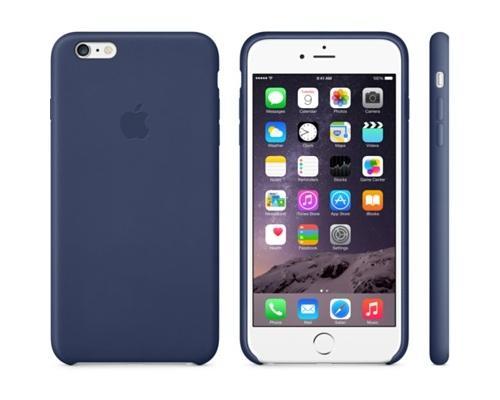
Apple’s own leather cases for the iPhone 6 and 6 Plus are as simple as cases get. Priced at $45 and $49 for the 6 and 6 Plus, respectively, Apple promises that these leather cases will protect your phone without adding much bulk.
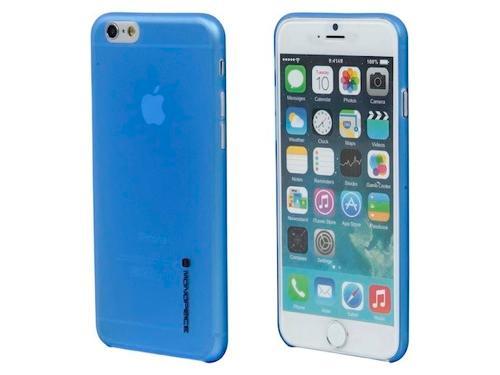
Monoprice’s ultra-thin shatterproof case for the iPhone 6 is available for just $5.60 and will protect your precious smartphone against the nicks and cuts that result from everyday drops. It won’t, however, protect your screen much. So if your iPhone face-plants, its screen is still at risk of shattering. But if you want a case for your phone and don’t want to spend $50, you can’t go wrong with this one.
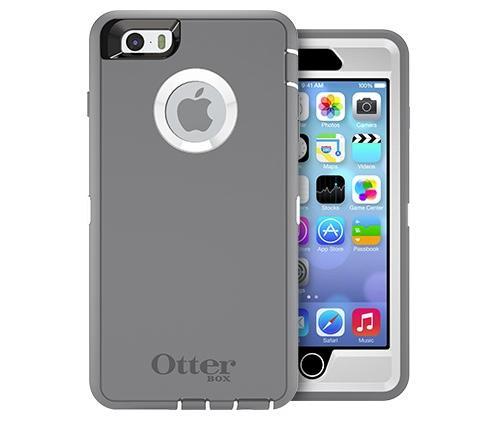
OtterBox is known for offering super-sturdy smartphone cases, and its Defender Series is the company’s beefiest of all. Priced at $59.90 and $69.60 for the iPhone 6 and 6 Plus, respectively, the Defender Series packs three layers of protection, a built-in screen protector, and port covers to protect against dust. And for everyone stuck in 2009, the Defender also includes a belt holster that doubles as a kickstand.
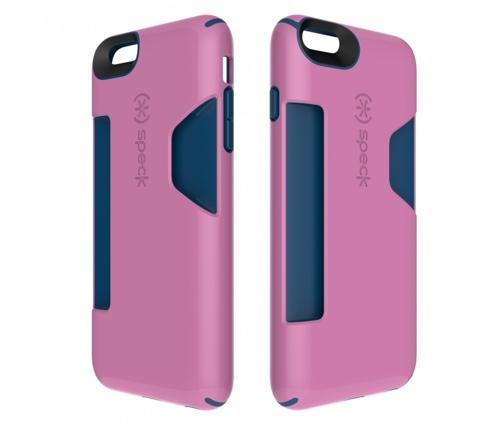
Want to protect your iPhone and ditch your wallet? The Speck CandyShell Card Case has you covered. Offering an impact-resistant outer coating and a raised bezel to protect your phone’s display, the Card Case is seriously durable. What’s more, its backside features room for three credit cards and some folded bills. Priced at $39 for the iPhone 6 and $44 for the iPhone 6 Plus, it’s a 2-for-1 special for your smartphone.
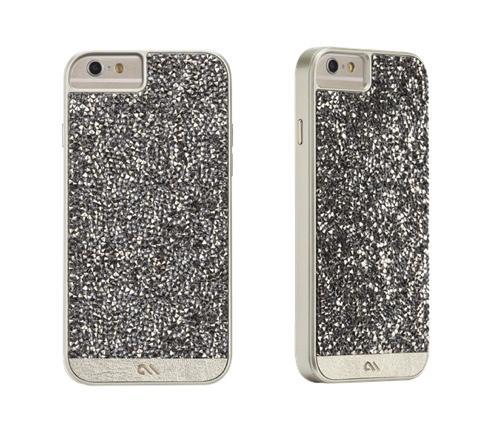
If you want to add some extra pizazz to your iPhone 6 or 6 Plus, look no further than Case-Mate’s Brilliance Case. At $80 for both iPhone 6 and 6 Plus models, the Brilliance Case’s back panel is covered in shimmering crystals. The Brilliance isn’t just a pretty face, though. It also offers dual-layer protection, and its bezel extends past the iPhone’s display to keep it from smacking against the floor if you drop it face-down.
![Stowaway [Advance] iPhone case from Incipio](https://s.yimg.com/cd/resizer/2.0/FIT_TO_WIDTH-w500/e739a9071438f6e957e96f509455458472e898f0.jpg) The Incipio Stowaway [Advance] is what happens when you smash a phone case, a wallet, and a kickstand together really hard. Priced at $34.99 for either the iPhone 6 or the 6 Plus version, the Stowaway includes a slot for up to three credit cards, your ID, or cash. A kickstand situated above the credit card slot lets you prop up your phone to watch movies or TV shows. Oh, and it’ll protect your phone, too.
The Incipio Stowaway [Advance] is what happens when you smash a phone case, a wallet, and a kickstand together really hard. Priced at $34.99 for either the iPhone 6 or the 6 Plus version, the Stowaway includes a slot for up to three credit cards, your ID, or cash. A kickstand situated above the credit card slot lets you prop up your phone to watch movies or TV shows. Oh, and it’ll protect your phone, too.
7. Radius v2
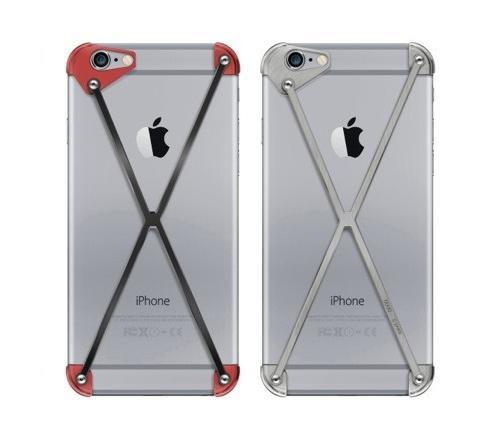
The folks at BiteMyApple call this case the bikini of iPhone cases, and for good reason. The Radius v2 uses the bare minimum of material needed to cover and protect your iPhone 6 ($79) or 6 Plus ($89) from drops, bumps, and bruises. Unlike most cases, the Radius v2 doesn’t completely cover up the iPhone 6’s beautiful shell. The trade-off is that it also leaves the phone more exposed, making it susceptible to scratches and nicks. That said, it certainly looks cool.
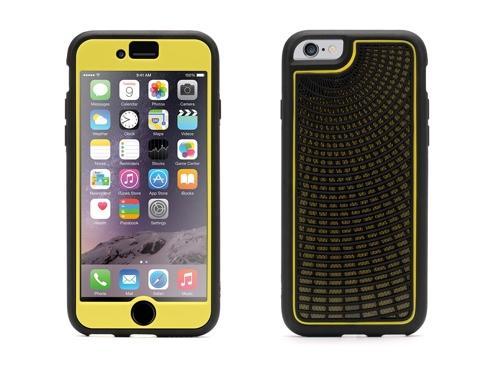
The iPhone 6 and 6 Plus have taken some knocks for being a bit more slippery than their predecessors. Griffin Technology’s Identity Performance case ($40) seeks to solve that problem with a no-skid back panel. And if your phone does slip from your grasp, the Identity Performance’s shell will protect it from drops as high as 4 feet. An included reusable screen protector will also keep your iPhone’s display safe from scratches and nicks.
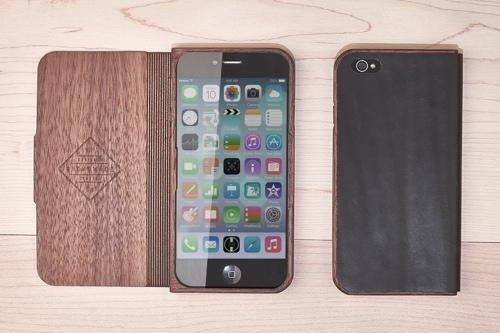
Grovemade’s Walnut and Leather iPhone Case lets your iPhone go au naturel without you having to fear that it’ll break if it slips from your hand. That’s because, Grovemade’s cases are made using all-natural walnut wood. Get it, naturel, natural? … Anyway, the Walnut and Leather iPhone Case protects your iPhone from falls while also doubling as a stand thanks to its flexible leather cover. These handcrafted cases cost $129 for the iPhone 6 and $139 for the 6 Plus.

Tech21’s cases use a special D30 material that is both flexible and durable to help absorb impacts from falls. They’ve smashed the stuff with a hammer in demonstrations, and it doesn’t break. Available for $35 for the iPhone 6 and $39 for the 6 Plus, the Classic Shell offers protection for both the front and back of your precious smartphone. But please don’t try the hammer thing.
Daniel Howley
Yahoo
Daniel Howley
Yahoo
Tuesday, 23 September 2014
Owners Report That the iPhone 6 Plus Is Susceptible to Bending
Apple’s iPhone 6 Plus appears to have a hidden feature, though it’s one you might not want to test out. According to a report by MacRumors, Apple’s latest smartphones are susceptible to bending out of shape if kept in your pocket for too long.
MacRumors’ report is based on posts by two of its forum members. The first forum member, Hanzoh, said that he kept his iPhone 6 Plus in his front pants pocket for about 18 hours.
During that time, he said, he drove to a wedding, danced, and sat down for varying periods. Later, when he took his iPhone out of his pocket, he noticed that it had a slight bend at its midsection.
Bent iPhone 6 Plus
A second MacRumors forum member, DevinPitcher, claimed that his friend’s iPhone 6 Plus bent after his friend put it in his pocket and got into his car. Both Hanzoh and DevinPitcher provided photos of their iPhone 6 Pluses to back up their claims.
As MacRumors points out, past forum members have seen similar problems with the iPhone 5 and iPhone 5s. Those owners reportedly received replacements for their bent handsets from either Apple or their carriers.
That the iPhone 6 Plus is capable of bending isn’t out of the realm of possibility. The phone is not only Apple’s largest, but it’s also one of its thinnest.
In fact, Lewis Hilsenteger over at Unbox Therapy tried bending his iPhone 6 Plus after reading reports of its flexibility, and managed to put quite the kink in the handset. Though, it took a good amount of force for him to see any results.
Daniel Howley
Yahoo
MacRumors’ report is based on posts by two of its forum members. The first forum member, Hanzoh, said that he kept his iPhone 6 Plus in his front pants pocket for about 18 hours.
During that time, he said, he drove to a wedding, danced, and sat down for varying periods. Later, when he took his iPhone out of his pocket, he noticed that it had a slight bend at its midsection.
Bent iPhone 6 Plus
A second MacRumors forum member, DevinPitcher, claimed that his friend’s iPhone 6 Plus bent after his friend put it in his pocket and got into his car. Both Hanzoh and DevinPitcher provided photos of their iPhone 6 Pluses to back up their claims.
As MacRumors points out, past forum members have seen similar problems with the iPhone 5 and iPhone 5s. Those owners reportedly received replacements for their bent handsets from either Apple or their carriers.
That the iPhone 6 Plus is capable of bending isn’t out of the realm of possibility. The phone is not only Apple’s largest, but it’s also one of its thinnest.
In fact, Lewis Hilsenteger over at Unbox Therapy tried bending his iPhone 6 Plus after reading reports of its flexibility, and managed to put quite the kink in the handset. Though, it took a good amount of force for him to see any results.
Daniel Howley
Yahoo
Bandits Steal Berlin IPhone Cash, Showing Payment Hurdle
Bloomberg - If bandits rob banks because that’s where the money is, then it makes sense to hold up an Apple Store in Germany on the day after a new iPhone is released -- because that’s where the cash is.
Late Saturday afternoon, with would-be iPhone buyers still queuing in front of Apple Inc. (AAPL)’s marble-and-glass emporium on Berlin’s Kurfuerstendamm, three masked gunmen stormed a security company’s van that was hauling away the pile of euros the store had taken in over the weekend.
One reason the outlet had so much cash on hand: Germans are famously behind much of the developed world in credit- and debit-card payments, with cash still used in more than half of money spent in stores. The iPhone 6, released Sept. 19, presents an opportunity for Germans to move toward a cashless future.
Whereas Americans, Scandinavians, French and Italians can buy a cup of coffee or a pack of gum with a card, it’s rare for Germans to use plastic for such payments, and it can be hard to find a cafe or restaurant in Berlin, Munich or Frankfurt that will accept credit cards.
Just 15 percent of retail payments in Germany are made by credit or debit card, the lowest among seven countries studied by the European Central Bank in a paper released in June. In the U.S., by contrast, 45 percent of payments are made by card.
While it’s easy to use plastic at Apple’s Berlin store, it’s not uncommon to see customers pay cash for iPhones or computers costing hundreds of euros. A staff member who answered the phone at the shop declined to make a manager available to comment. Police declined to say whether they had any leads on the identity of the thieves. Apple declined to comment on matters of security at its Berlin store.
Apple Pay
A key feature of the iPhone 6 is something called Apple Pay. The service, which the company expects to introduce in the U.S. in October, will let customers shop in stores and online by tapping their finger on the phone’s fingerprint scanner rather than paying cash or swiping a card. Apple hasn’t given details about plans for Apple Pay outside its home market.
“Apple Pay has the critical mass to accelerate the transition toward digital payments,” Barclays Bank Plc analysts said in a note released Sept. 19.
Germans have already started moving -- slowly -- away from cash. People in the country used cash for 53 percent of the money they spent in stores in 2011, down from 58 percent three years earlier, according to the most recent data from the country’s central bank, the Bundesbank.
That change, though, won’t accelerate unless German worries about privacy and data security are addressed, said Richard Crone, founder of Crone Consulting LLC, a mobile payments researcher in San Francisco.
Security Breaches
And those concerns give a system like Cupertino, California-based Apple’s an advantage, Crone said. The technology doesn’t reveal a customer’s identity or payment information to the vendor, which means shoppers face less risk from security breaches such as the recent theft of millions of credit card numbers from retailers such as Target Corp. (TGT) and Home Depot Inc. (HD)
“You cannot get rid of this risk until you get rid of the card,” and Apple’s system does just that, Crone said.
Google has its own cash replacement, software called Google Wallet, and Vodafone Group Plc (VOD), Telefonica SA (TEF), Royal KPN NV (KPN) and Deutsche Telekom AG are trying to gain traction for similar services. While the competition will hasten the introduction of new ideas into the market, it could slow adoption by consumers because it could sow confusion in the market.
“There are a lot of conflicting technologies out there,” said Thad Peterson, a consultant at Aite Group, a research firm in Boston. “Companies and customers have been on the fence because there has been no technological standard in mobile payments.”
Brazen Heist
The heist was brazen. The Apple store, a former movie palace built a century ago, was flooded with people checking out the new phones and shoppers thronged the busy boulevard outside. The bandits rushed the cash transporter and carried off a chunk of the day’s earnings. The robbers jumped in a Citroen sedan and sped off. A short time later, police say they found the burning remnants of the getaway car in a wooded area about two miles from the store.
Though authorities and Apple haven’t said how much the thieves got away with or whether the money was insured, the hold-up won’t do much damage to Apple, which reported cash and investments of $164.5 billion at the end of last quarter.
Apparently, the bad guys didn’t nab any of the new phones while making their getaway.
Subscribe to:
Comments
(
Atom
)













